The first lockdown, the first phase of the pandemic, is hidden far away in the fog of memory. What was it like back then when a new, unknown virus suddenly appeared and the world went into a state of shock for a while? A whole series of tragic major crises later, it feels, not for everyone, but for many, as if the pandemic took place in the distant past and did not start just three and a half years ago. So what is left behind, what memories can societies build on in order to analyze what happened as correctly as possible, process it and draw lessons from it?
Psychologists around Philipp Sprengholz from the University of Bamberg and Cornelia Betsch from the University of Erfurt show just in a study in the science journal Naturethat memories of the pandemic are usually distorted. And that applies in both directions: some exaggerate the risk at the time, others downplay it.
The decisive factor is the vaccination status of the respondents and the question of how important this is for their own identity. For a while, it played an important role in the public discourse and in the collective scolding whether one belonged to the camp of the immunized or the unvaccinated. Some patted themselves on the back as sensible, solidarity-based citizens, while others saw themselves as fighters against coercion and paternalism. The survey shows: Both vaccinated and unvaccinated people remember the pandemic in a way that fits their decision for or against the vaccine. It is a form of motivated thinking, argues the psychologist Sprengholz.
Promised rewards reduce the effect of memory bias
The psychologists evaluated data which have been collected regularly as part of the Cosmo study since the start of the pandemic in 2020. At the end of 2022, the scientists surveyed 1,644 participants from Germany again. The test subjects provided information about their current assessment, for example about the risk from the corona virus. In addition, they were also asked to remember their answers or their assessment from the early phase of the pandemic. Vaccinated participants overestimated how high they perceived the risk of infection in previous surveys. In retrospect, they reported a greater sense of risk than in the first surveys in 2020 and 2021. The same picture emerged among the unvaccinated test subjects, albeit under the opposite circumstances: in their memory, their sense of risk was even lower during the peak phase of the pandemic , than they actually stated at the time.
A similar picture emerged from the retrospective assessment of the measures taken to combat the pandemic. On average, vaccinated people overestimated their approval in the past, while unvaccinated people remembered an excessively negative attitude. Both immunization and the refusal of it played and still play a major role in the self-image of many people. “The group identification on this issue continues beyond the pandemic,” says Sprengholz. In fact, in the survey from December 2022, a total of 66 percent of the unvaccinated and 62 percent of the vaccinated said that they identified or even strongly identified with their immune status. “The more strongly the participants identified with their vaccination status, the greater the memory distortion,” says the psychologist.
In another study with more than 3,000 participants, psychologists examined whether and, if so, how the distorted memory can be corrected. To do this, the researchers informed the test subjects about the phenomenon of memory distortion, which showed no or almost no effects. If the participants were offered financial rewards if they correctly remembered their own assessments from the first years of the pandemic, this at least had a certain corrective effect: but only if the payments were reasonably generous. Small rewards, however, almost did not reduce the distortions.

